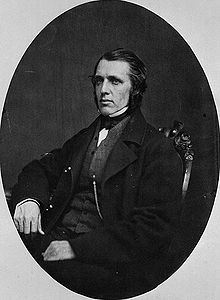William McDougall (politician)
|
The Honourable William McDougall |
|
|---|---|
 |
|
| Member of the Canadian Parliament for Lanark North |
|
|
In office 1867–1872 |
|
| Succeeded by | Daniel Galbraith |
| Member of the Canadian Parliament for Lanark North |
|
|
In office 1878–1882 |
|
| Preceded by | William McCraney |
| Succeeded by | William McCraney |
| Lieutenant-Governor of Rupert's Land and the North-Western Territory | |
|
In office 1869–1870 |
|
| Monarch | Victoria |
| Succeeded by | Adams George Archibald |
| Member of the Legislative Assembly of Ontario for Simcoe South | |
|
In office 1875–1878 |
|
| Personal details | |
| Born |
January 25, 1822 York, Upper Canada |
| Died | May 29, 1905 (aged 83) Ottawa, Ontario, Canada |
| Political party | Liberal-Conservative |
| Cabinet | Minister of Public Works (1867–1869) |
Sir William McDougall PC CB (January 25, 1822 – May 29, 1905) was a Canadian lawyer, politician, and one of the Fathers of Confederation.
William McDougall was born near York, Upper Canada (now Toronto, Ontario) to Daniel McDougall and Hannah Matthews. William was the third generation of United Empire Loyalists to settle in York. In 1793, his paternal great-great grandparents were among the first twelve families to move to York along with 450 British troops. Those soldiers then built Fort York to protect against American invasion.
McDougall received his education at Victoria College in Cobourg, Upper Canada, and in 1847, began practising law as an attorney and solicitor in Upper Canada. In 1862, he was called to the Upper Canada Bar.
In 1849, William McDougall's office in Toronto was the meeting place for the Clear Grit political movement. Other Clear Grit supporters included Peter Perry, David Christie, Charles Clarke, Charles Lindsay, and Malcolm Cameron. In 1850, he started The North American, a liberal newspaper.
He was elected as a member of the legislative assembly in 1858 and served as Commissioner of Crown Lands and Provincial Secretary.
In 1863, Along with Alexander Tilloch Galt, McDougall went to Washington D.C. to meet with President Abraham Lincoln in order to renegotiate the Reciprocity Treaty. During the visit, Lincoln explained that he had an important event to attend and had to travel to Pennsylvania. The President had then invited McDougall to accompany him on his trip by train and coach. They stayed the night at the private home of David Wills, a wealthy 32-year-old Gettysburg attorney.
...
Wikipedia
